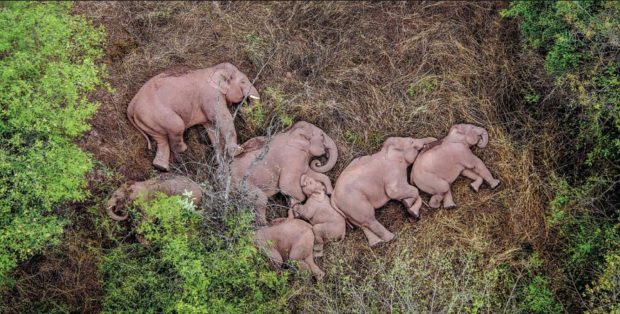March of the elephants: China’s rogue herd spotlights habitat loss

Wild Asian elephants take a break on Monday in Jinning district of Kunming, Yunnan province. The herd has made a temporary stop along their migration in Kunming’s outskirts, authorities said on Monday. PROVIDED BY YUNNAN FOREST FIRE BRIGADE via China Daily/Asia News Network
BEIJING — A mammoth trek across southern China by a herd of elephants that has captivated the world with their playful antics has thrown a spotlight on the loss of their habitat and conservation challenges.
The lumbering mammals have journeyed around 500 kilometers (310 miles) from their home in one of the longest animal migrations of its kind recorded in China.
Scientists are still baffled by what prompted the elephants to leave their home at the Xishuangbanna National Nature Reserve, bordering Laos.
Since setting off in spring last year they have pilfered shops and trampled crops worth over $1 million, and thousands of residents have been evacuated from their path.
“For some reason these elephants felt that their traditional home range was no longer suitable… and then they just left to find somewhere else,” Ahimsa Campos-Arceiz, an elephant specialist at the Xishuangbanna Tropical Botanical Garden, told AFP.
Article continues after this advertisement“But they didn’t have a destination in mind. They are just moving around trying to find a place that will work for them.”
Article continues after this advertisementOfficials have been tracking the wandering herd with drones round the clock, worried they might go on a rampage if they are stressed.
Elephants rely on infrasonic sound — the vibration of their feet — to communicate but in towns they can be easily confused due to vehicle noises.
“What has surprised me the most is that these elephants are very healthy and look very happy despite roaming in densely populated, unfamiliar areas,” Campos-Arceiz said.
“These elephants are very playful, which tells me that they are fine,” he added.
Forest destruction
Forests in far southwest Yunnan province where the elephants came from are rapidly giving way to rubber and tea plantations, and herds have become marooned in disconnected preserves.
China is one of the few places in the world where the population of the endangered Asian elephant is increasing, due to strict anti-poaching laws and conservation efforts.
The country’s wild elephant numbers have doubled to over 300 animals in the past three decades.
But their habitats have shrunk by nearly two-thirds over the same period, said Zhang Li, a professor of ecology at Beijing Normal University.
Habitat fragmentation — with hydropower plants and highways blocking old migration paths — makes it difficult to find mates and socialize.
Electric fences built to safeguard villagers also risk injuring wandering animals.
Forest destruction has led to a surge in conflicts between elephants and villagers in the region in recent years.
From 2013 to 2019, more than 70 people have been trampled to death and dozens injured by marauding elephants in Yunnan, data from the local wildlife office shows.
Mammoth task
Scientists are unsure whether a changing landscape was the prompt for the herd’s migration, which has made them famous online and drawn international media to follow the march.
Fans have cooed over videos showing a matriarch saving a calf from a gutter and one where elephants line up in a courtyard to drink water with one successfully turning on a tap with its trunk.
State TV launched a 24/7 live elephant video stream to follow the movements of the 15 animals, which includes two calves born on the road.
But with the elephants showing no sign of returning home or settling down in a new place, attempts by wildlife officials to direct them could be risky, experts warn.
Using truckloads of pineapple and sugarcane to bait them could irreversibly domesticate the herd.
“It’s like getting a child used to eating sugar,” said Wang Hongxin from Beijing Normal University.
During his surveys of elephant habitats in Yunnan, Wang has seen how “elephant canteens” planted with corn, bamboo and wild bananas to dissuade the beasts from pilfering fields have changed their diet, making them more prone to disease.
“The current march spotlights the threats facing Asian elephants,” he added, warning conflicts would rise if habitat size is further reduced.
“Humans must retreat and let land return to the wild.”